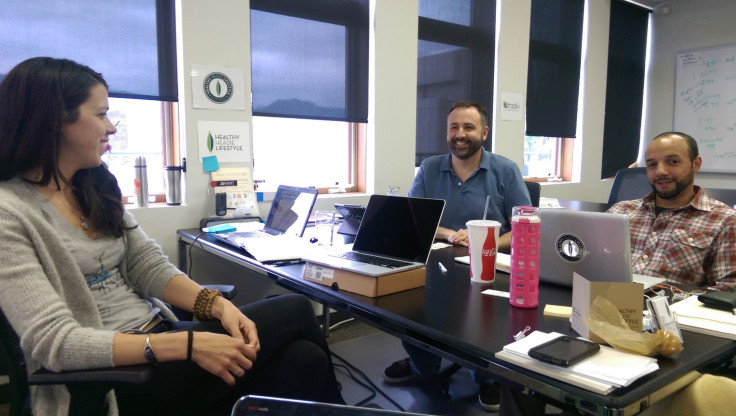Can CanopyBoulder, The World’s First Cannabis Accelerator, Prove There’s Substance Behind The Marijuana Startup Hype?

BOULDER, Colorado -- Holly Alberti-Evans considers herself among Colorado’s marijuana business success stories. Healthy Headie Lifestyle, the in-home direct sales company for cannabis products she founded with her husband, Steve Evans, is growing, with a busy office in Boulder and an expanding team of independent distributors who demonstrate vaporizers to those Alberti-Evans calls the “canna-curious” in the privacy of their homes. (Hosts provide their own marijuana if they want to take the devices for a full test drive.) What’s more, Alberti-Evans is constantly fielding calls from those wanting to invest in the enterprise.
“We have had an overwhelming response,” says Alberti-Evans. “There is absolute excitement around our business model and everyone wants to participate.”

Rewind to two months ago, and Healthy Headie Lifestyle looks very different. In late June, the company has no office, very little money and everything is resting on Alberti-Evans’ ability to sell her company in the briefest of terms to potential investors in a cavernous conference hall.
“We are the Mary Kay of Mary Jane,” she says, leaning forward and aiming her thousand-watt smile at a couple of well-dressed businessmen sitting across from her. It’s Day One of an investor pitch forum organized by the ArcView Group, one of the biggest names in venture capital funding for cannabis startup companies. The event begins with a “speed dating” activity, which means Alberti-Evans has just a few minutes to recite her well-honed spiel and hand over her business card (one businessman offers her a cannabis vape pen in return) before the bell rings.
Ding!
Then it’s time for Alberti-Evans and her fellow marijuana entrepreneurs to switch seats and continue looking for potential investors willing to bankroll their dreams.
“I am feeling fantastic,” says Alberti-Evans in between speed-dating rounds. But there’s a hint of stress in her voice. As she navigates the cavernous conference hall, moving from one table of investors to the next, she glances around the room, trying to distinguish the big financial fish from the others.

Healthy Headie Lifestyle was one of 10 nascent companies chosen from more than 100 applicants for the first class of CanopyBoulder, a new-business accelerator that’s the first of its kind focused on the cannabis industry. Based on ballyhooed tech accelerators like Techstars, the idea behind CanopyBoulder is to fuse great marijuana business ideas with much-needed financial acumen. Now CanopyBoulder is gearing up for a new batch of companies; its fall class began Monday.
For 13 weeks, Alberti-Evans and her fellow classmates received a crash course in developing and launching a marijuana business. And now, as the group’s final test, it has all come down to whether they can win over investors here at the ArcView event and at a similar pitch forum at a Cannabis Business Summit in Denver several days from now. It’s like “Shark Tank” for the cannabis industry.
At the event, word starts spreading that there may not be as many sharks as expected. That means the speed-dating activity is essentially a high-stakes game of musical chairs. If Alberti-Evans and the other entrepreneurs don’t move fast enough between rounds and land a coveted seat next to a potential investor, they could end up with no one to pitch to.
The speed-dating scramble encapsulates the promise and peril of the cannabis startup scene. As an increasing number of states legalize medical and recreational marijuana, entrepreneurs and investors see a lucrative new business opportunity. The cannabis industry grew 74 percent in 2014 to $2.7 billion and is on track to hit $11 billion by 2019, according to San Francisco-based ArcView, whose 480 member investors have pumped more than $40 million into 70-plus companies since its founding in 2010. Snoop Dogg has turned into a marijuana investor, videogame titans are launching edibles companies and Bob Marley has become a brand name.
But is there real substance behind all the hype and headlines? Are investors really willing to wade into the heady quasi-legal world of marijuana? With all of the regulatory restrictions, social stigma and dubious business schemes plaguing the cannabis scene these days, experts both inside and outside the industry question whether we’re seeing real entrepreneurial innovation around marijuana -- and if we are, whether the financiers are there to shepherd these ideas to reality.
“I am optimistic about the entire marijuana industry, but I am pessimistic about all of the noise around it these days,” says Adam Bierman, managing partner of the Los Angeles-based marijuana consulting firm MedMen. “There’s a lack of institutional dollars conjoined with a lack of institutional talent and wherewithal. I don’t have a very strong belief level in the startups at this point.”
Maybe then there’s more at stake here at the investor forums than just the bottom line for Alberti-Evans and her fellow entrepreneurs. If the select few startups chosen for CanopyBoulder -- the best of the best -- can’t land deals at the premier cannabis investor events, what chance does anyone else have at launching or funding the Facebook of pot?
Cultivating Marijuana Businesses
“You are not selling the opportunity!” instructs Micah Tapman, program manager of CanopyBoulder. It's Monday afternoon in the CanopyBoulder headquarters – a small office space above a bagel shop and a Dairy Queen along a busy street in north Boulder – and the investor pitch forums for the first CanopyBoulder class are two weeks away. Right now everyone is taking their minds off looming end-of-class deadlines by taking turns talking up potential investors at a make-believe cocktail party, with their fellow classmates and teachers standing in for well-heeled suits.
Meghan Larson, co-founder of a cannabis ad network called Adistry, is halfway through discussing how most digital ad networks limit marijuana-related content when Tapman cuts her off. Play up your exciting prospects, he tells her: how Google’s $373 billion market capitalization is based largely on its digital advertising revenue; how the cannabis industry is sorely underserved when it comes to advertising; how Adistry is the first company of its kind to offer video ads.
“This is like hand-to-hand combat,” adds Patrick Rea, CanopyBoulder’s managing director at the end of the practice; the companies need to be able to parry every question and comment thrown their way. “I think we all need a little more practice,” he adds. “Because guess what: This starts tomorrow.” All of the companies will be attending a Cannabis Capital Summit in Denver the next day hosted by the nonprofit Rockies Venture Club, the first investor get-together leading up to the big pitch events in two weeks.
Pitch practices like this have become par for the course at CanopyBoulder. Over the past 11 weeks, the program’s inaugural class has spent long hours together in this cramped office space, working one on one with mentors in the cannabis industry and the local tech scene, developing their company visions, tweaking and re-tweaking their business plans and perfecting their selling points. It’s all about turning their ideas into marketable businesses.
“I believe we are looking at an industry that will reach $150 billion a year just in America,” says Steve DeAngelo, co-founder of the ArcView Group and director of the prominent California dispensary Harborside Health Center. “But there was an unfilled niche and an unfilled need in the market: companies that were investor-ready. We have seen within ArcView that there are lot of people with really creative ideas, good teams and good plans, but they are really not prepared to take their early stage ideas to investors.” That’s why ArcView partnered with Rea and Tapman to launch CanopyBoulder, announcing in late 2014 it was looking for marijuana-related ventures that were interested in the boot camp and $20,000 in seed capital in exchange for a 9.5 percent stake in each company.
The chosen ventures came from all over the country and beyond. Jonathan Ofir arrived from Israel with the concept for Leaf, a fully automated hydroponic marijuana growing system controlled via a smartphone app. Ofir, who previously launched Alcohoot, a $99 personal smartphone breathalyzer, says his idea for the technology likely never would have left his head if he hadn’t been accepted by CanopyBoulder. “The accelerator was 95 percent of why I came out here,” he says. Now, after a few months of work, he has a full-size working prototype.

Like Ofir, Roy Bingham, a British-born serial entrepreneur with a Harvard MBA and 30 years of business experience, had no prior involvement in the marijuana business. “[CanopyBoulder] was about the introductions and getting out and about to the [marijuana] stores in Boulder and Denver, being set up to do Q-and-As with store managers and learning about brands in a fairly anonymous way,” he says. The result was BDS Analytics, a cannabis-based data analytics company.
Jeremy Bamford, on the other hand, spent several years running ColoradoPotGuide , an online visitor guide, out of his house as a side job before joining CanopyBoulder. Under the accelerator’s guidance, he soon purchased PotGuide.com and plans to have guides available for at least eight other states by November. “They’ve taught me to think more like a CEO,” he says. “I knew it was going to be a boot camp, but I think I underestimated the intensity. I think everyone has worked every day for the past 10 weeks.”
For many of the CanopyBoulder companies, there’s more than just a financial incentive behind the hard work; it’s also about legitimizing cannabis use through lawful business ventures. Healthy Headie Lifestyle’s Alberti-Evans and her husband helped lobby for the passage of Massachusetts’ medical marijuana law in 2012 while running a commercial painting company in Plymouth, then launched their in-home demonstration company for local medical marijuana patients two years later. “The reason we started this company was I didn’t want someone selling snake oil to someone who is dying,” says Alberti-Evans. With a year of sales under their belt, the couple drove to Boulder packed into a Subaru with their two Healthy Headie employees, and since then the four have been sharing a rental house and living off supermarket pizza slices. “It’s like the Real World without the cameras,” she says.

While these and the other ventures CanopyBoulder has been developing are intriguing, on the surface none seem to promise paradigm-shifting advances in the industry, the way that Netflix shook up the in-home movie-watching business or Uber is revolutionizing hailing a cab. That could be in part because none of these companies are actually involved in producing, processing or selling marijuana. Because of Colorado restrictions on out-of-state investment in companies that “touch the plant,” CanopyBoulder is only open to ancillary businesses.
But the world of marijuana side businesses is getting increasingly crowded. “You can only have so many marijuana jars,” says Jill Lamoureux, a Colorado-based cannabis business consultant. “You can only have so many marijuana lawyers. There are so many ancillary businesses trying to get in, it is becoming more competitive than developing actual marijuana products.”
And then there’s the specter of major brands moving in. “Even if you have a great idea and are able to find enough talent to staff your company, the traditional industry players are not in cannabis yet,” says MedMen’s Bierman. “What happens when Yelp decides to get into cannabis? If somebody is already the Yelp of cannabis, maybe they get bought out, or maybe they don’t.”
It’s why the clock is ticking for the CanopyBoulder companies -- not just to make a splash at the investor forums but also to establish themselves in the industry before bigger players box them out. “We want to change the world,” says Alberti-Evans. “This is the only time we will have the ability to do that.”
Where Are The Investors?
Bingham of BDS Analytics surveys the scene at Rockies Venture Club’s Cannabis Capital Summit and frowns. For the past several hours, CanopyBoulder companies and other marijuana startups have been presenting their business plans at the summit, held in an old Denver theater turned event center, and now, in the theater’s retrofitted lobby, folks are schmoozing and trading business cards. Nearby, Ofir has switched on his Leaf prototype, and the strange pink glow of the four-foot-tall machine’s internal grow lights attracts summit attendees like moths to a lightbulb.
From Bingham’s point of view, the event hasn’t proven to be the financial opportunity he was hoping for. “I’ve had about six decent conversations all day,” he says. “There is a lot of toe-dipping, but not much else.”
There’s a reason most of the investors here aren’t yet ready to dive into the marijuana industry, says Sara Baris, who’s attending the summit as Colorado managing director for the crowdfunding investment platform SeedInvest. “Right now, the regulatory issues are too much,” she says. “It’s just the overarching risk of the federal government changing its mind. We already have so much uncertainty in the equity investment space.”
Some investors are becoming bullish about cannabis. There are marijuana hedge funds like Poseidon Asset Management, dedicated marijuana portfolios at global investment funds like Dutchess Capital and marijuana private equity firms like Privateer Holdings, which earlier this year scored $75 million from the powerful venture capital firm the Founders Fund. According to Marijuana Business Daily’s 2015 factbook, the amount of capital available for cannabis startups and expansions has grown by at least 900 percent over the past year -- leading some people to wonder if there are now more investment funds available than opportunities to invest in.
But these sorts of investment dollars, much of it from private individuals, are still miniscule compared to what could be available from traditional sources of capital like major investment funds and big private equity firms -- and so far, most of these investment sources have shied away from dabbling in cannabis.
Part of the problem is that while marijuana investments might seem flashy, these days they seem like anything but a sure bet, and even less like opportunities with quick and clear exit strategies. “I think still overwhelmingly the industry is being funded by friends and family,” says Taylor West, deputy director of the National Cannabis Industry Association. “Between banking, the difficulty of building a multistate operation and the legal gray area on the federal level, there are hurdles to luring investors who don’t have a personal stake.”
Cannabis investments have also gotten a bad rap from the hundred-plus marijuana penny stocks trading on the thinly regulated over-the-counter market, most of which seem to be producing nothing at all other than shady mergers and rousing press releases designed to fuel pump-and-dump schemes. (Last spring, the Securities and Exchange Commission suspended trading on several of these stocks based on questions about the companies’ operations and suspicion of illegal activity.)
Plus cannabis is still considered a “sin” industry alongside gambling, guns and alcohol -- not the sort of thing that public pension funds and university endowments like to get involved in. “Even with these ancillary businesses, if you are an investor, you are still being tied to something tied to cannabis,” says Dave Harris, director of operations for the Rockies Venture Club. “I think there is still reluctance to that fact. They are still exposed to this industry that outside of Colorado and Washington state is still considered taboo.”
And while, unlike many of the marijuana penny stocks, the companies pitching at the Cannabis Capital Summit boast real products and services, the multimillion-dollar pre-money valuations touted in many of the presentations give some observers pause. With the industry still so underdeveloped, where exactly are these values coming from? “One of the challenges is you don’t have a lot of tools and technology you can leverage to assess companies,” says Joe Hodas, chief marketing officer for Colorado edibles company Dixie Elixirs & Edibles. “Until there is a real baseline established for the industry, I don’t think we will have that information.”
Some argue the marijuana startup valuations being bandied about these days could increase once the cannabis industry wins full access to banking. Others, however, argue the opposite -- that these values are based on the illegal price for marijuana, a price that will plummet as legalization spreads. “People are selling marijuana businesses in Colorado for millions and millions of dollars while we are seeing articles about prices dropping,” says Kayvan Khalatbari, co-owner of the Denver Relief dispensary and a national cannabis consultant. “We are already meeting demand, and people are continuing to build facilities. The prices will continue to drop to where there won’t be a viable business left where there will be money to be had."
The Final Test
Late in the afternoon on the first day of the ArcView investor pitch forum, Alberti-Evans walks on to the conference hall’s stage.
“We’ve found there is a huge demographic of individuals who are not being taken care of," grandmothers, corporate executives and the entire baby boomer generation, which, Alberti-Evans points out, controls 70 percent of the country’s disposable income. “They are canna-curious,” she says, “They are looking for that education. They are looking for that information, and they want it in a safe, comfortable environment. And why not do that right in their home?”
Alberti-Evans hammers home the opportunity for in-home direct sales of marijuana paraphernalia: In 2014, one in eight households engaged in direct selling. When Healthy Headie Lifestyle recently launched a pilot program, in four days it received more than 500 independent distributor applications from 45 states and Canada, with each applicant willing to purchase at least a $600 sales kit. And last year, while running the company on a part-time basis in Massachusetts’ limited medical marijuana market, she and her husband generated $50,000 in revenue.
She wraps up with her ask: $500,000 in seed capital, with a $50,000 minimum commitment.
Alberti-Evans concludes to heavy applause -- as do all the other CanopyBoulder companies. “That’s how you do it!” exclaims Rea after a particularly adept presentation by one of his mentees. “What you are seeing here is everybody peaking.” He’s already thinking about future pitch forums like this; Canopy aims to launch a San Francisco-based boot camp early next year. (Television producers have already been sniffing around the program; we could eventually see “Shark Tank,” the marijuana edition.)
A Glimpse Into The First CanopyBoulder Class of 2015 from Micah Tapman on Vimeo.
It’s clear the months of pitch practices have paid off for the first CanopyBoulder class. “I’ve got to say they have done a great job,” says Sam Znaimer, who’s attending the forum as CEO of Locarno Capital , a Canadian marijuana investment fund. “The quality of the presentations, the quality of the pitches is way better than the typical ArcView presentation of a year ago. You are seeing an immediate response to all of them, and I really see why.” Some of that response arrived before the pitch forum began; two CanopyBoulder companies take the stage knowing that in the previous week they’d already hit their fundraising goals.
What’s telling is that these weren’t the sleekest or most groundbreaking of the ventures, like Ofir’s attention-grabbing Leaf machine or Glasshous, which reimagines the head shop experience as a cool online shopping boutique. In fact, the first companies to be funded were among the most pedestrian of the bunch: Bingham’s data analytics company and Tradiv, an online marijuana wholesaling marketplace.
Maybe that’s because in a brand-new market like marijuana, you don’t have to come up with bold new innovations to make a splash. “There is so much newness in the cannabis industry that to me the most seemingly perfunctory companies are the most exciting from an industry perspective,” says Emily Paxhia, co-founder of Poseidon Asset Management. “When everything else is so new and fresh, it’s nice to see something that is baseline and necessary to improve the space.”

From the investors’ perspective, Healthy Headie Lifestyle is among the standout prospects. At the end of the ArcView event, Alberti-Evans is awarded a glittering rainbow-colored glass trophy -- the prize for best company pitch. Soon that award is backed by dollars: Now Healthy Headie Lifestyle has nearly reached its half-million dollar funding goal.
Between courting potential investors and organizing business events, the company is hosting a free party in Denver on Thursday to lure potential customers and distributors -- and helping to run in-home demos (a room full of 40-something Boulderites got hands-on training in how to use marijuana concentrates at a Healthy Headie event two weeks ago), Alberti-Evans is as busy as she was while at CanopyBoulder. "The whole process is super stressful," she says. "There is definitely a rollercoaster effect."
Still, Alberti-Evans knows her work is just beginning. While she might have perfected pitching her company, she still has to build it. And in the cannabis industry, even the best-laid business plans don’t always develop as expected. “We are looking forward to the journey,” she says. “We have a long road ahead.”
© Copyright IBTimes 2025. All rights reserved.






















